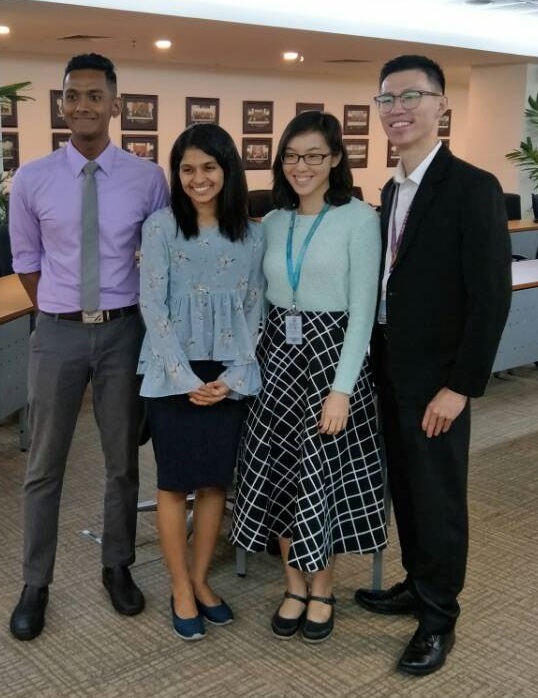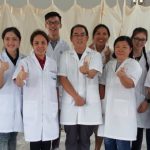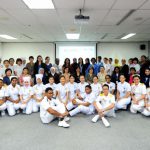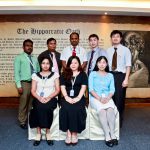The fast-paced technology has triggered tremendous transformations undergone by the healthcare industry over the past few decades. The healthcare system is now on its way towards an era of data-driven and genomics-based medicine. To name a few, we are now wearing wearable devices to monitor our health status and can provide us instant reading such as our heart rates. Many creative and innovative ‘apps’ that can help us manage and monitor our health are readily available for download using our smartphones nowadays. IBM Watson is also actively advancing artificial intelligence technology which can better monitor health data, predict diseases, and diagnose conditions. Personalised medicine is also taking place whereby treatments for diseases are tallied according to the patients’ genetic information. So what does the future of medicine hold, say, in another three decades? On 29 September 2017, four IMU Scholarship holders gathered and shared their viewpoints on the futuristic medicine in the “Forum of Medicine: Advancements of Healthcare in 2050” at the International Medical University (IMU), Bukit Jalil campus. The students were:
| Reena Prhiya | Bachelor of Medicine and Bachelor of Surgery (MBBS) programme |
| Liang Yee Ern | Bachelor of Pharmacy (Hons) (BPharm) programme |
| Sng Kim Sia | Bachelor of Chinese Medicine programme |
| Shamir Das | Bachelor of Psychology (Hons) programme |
 This forum was jointly organised by the IMU Scholars Committee which consists of scholarship holders from IMU, and the Institute for Research, Development, and Innovation (IRDI). This forum served as a good platform for IMU students to reflect and share their views and perspectives, based on current literature and research, the major changes that could possibly be foreseen in the field of healthcare in the next 30 years.
This forum was jointly organised by the IMU Scholars Committee which consists of scholarship holders from IMU, and the Institute for Research, Development, and Innovation (IRDI). This forum served as a good platform for IMU students to reflect and share their views and perspectives, based on current literature and research, the major changes that could possibly be foreseen in the field of healthcare in the next 30 years.
From the perspective of medicine, Reena pointed out that medicine had moved from the traditional non-specific methods of practice based mostly on trials and errors to the sub-specialised, compartmentalised, and holistic care focusing on long-term sustenance today. The practice of medicine will be continuously moving towards individualised and patient-specific care based on the patients’ genetic make-up. With medical advancement, no doubt that medical procedures will involve minimally invasive techniques. Also, alternative medicine will be more relevant to the conventional medicine as well.
Yee Ern from the BPharm programme gave an interesting talk on futuristic drugs in the pharmaceutical industry. It is now possible to produce drugs through 3D-printing to provide patient-specific medications customised according to patients’ needs. These drugs are developed based on the concept of personalised medicine whereby the size, dose, appearance, and rate of delivery of the drug are designed to suit each individual’s needs. In addition, 3D-printed drugs are more compact, easier to swallow, and can dissolve more rapidly.  Secondly, digital pills have also been in use. These are pills with “ingestible sensors” about the size of an almond that can be swallowed. It serves the main purpose of allowing the doctors to continuously monitor a patient’s vitals such as heart rate. The invention was based on the idea that it would save the patients from entering data manually. In addition, the current conventional clinical trials which are high cost and time-consuming will be replaced by in silico clinical trials which used microchips lined by human living cells for clinical trials to advocate that no animals or humans are harmed in the making of new drugs.
Secondly, digital pills have also been in use. These are pills with “ingestible sensors” about the size of an almond that can be swallowed. It serves the main purpose of allowing the doctors to continuously monitor a patient’s vitals such as heart rate. The invention was based on the idea that it would save the patients from entering data manually. In addition, the current conventional clinical trials which are high cost and time-consuming will be replaced by in silico clinical trials which used microchips lined by human living cells for clinical trials to advocate that no animals or humans are harmed in the making of new drugs.
| Kim Sia from the Chinese Medicine programme then deliberated on some of the futuristic advancements in the Chinese Medicine field. Traditional Chinese Medicine (TCM) which originated in ancient China has evolved over thousands of years. Along with technological advancement, some of the ancient practices have been replaced with more simple, sophisticated, and easier to use apparatus. For instance, in the past, people used manual weighing method when buying herbs. Nowadays, people are using automated weighing machine. Electrical kettle pots are used nowadays to cook herbal medicine instead of the ancient clay pots. In order to save time and hassle, people now opt for medications in the powder form and some even consume pills. Furthermore, TCM can help to combat the current rampant antimicrobial resistance as TCM remedies are free from drug resistance and hence could provide alternative solutions. |
 Lastly, Shamir from the Bachelor of Psychology programme provided a glimpse in the advancements in the psychology field in 2050. It could be foreseen that artificial intelligence will be playing vital roles in the near future by taking over many tasks in the healthcare delivery. There will be emphasis on integrated healthcare which combines primary healthcare and mental healthcare in one setting. New treatments will emerge as there is improvement in the molecular aspects of the psychological disorders. Interestingly, it will be moving beyond the self-report measures towards neuroscience methodologies to capture the psychological issues and mental health problems faced by the patients. The presentations were followed by a question and answer session moderated by Prof Chu Wan Loy, Deputy Director of IRDI and Dean of the School of Postgraduate Studies, IMU. The topic of the changes in the teaching and training of students required in line with the development of the medical advancements was discussed. Curriculum planning and development should also be revised to cater to the needs of the future of the Malaysian healthcare system. There is also a need to consider the cost of futuristic medicine and the practicality issue.
Lastly, Shamir from the Bachelor of Psychology programme provided a glimpse in the advancements in the psychology field in 2050. It could be foreseen that artificial intelligence will be playing vital roles in the near future by taking over many tasks in the healthcare delivery. There will be emphasis on integrated healthcare which combines primary healthcare and mental healthcare in one setting. New treatments will emerge as there is improvement in the molecular aspects of the psychological disorders. Interestingly, it will be moving beyond the self-report measures towards neuroscience methodologies to capture the psychological issues and mental health problems faced by the patients. The presentations were followed by a question and answer session moderated by Prof Chu Wan Loy, Deputy Director of IRDI and Dean of the School of Postgraduate Studies, IMU. The topic of the changes in the teaching and training of students required in line with the development of the medical advancements was discussed. Curriculum planning and development should also be revised to cater to the needs of the future of the Malaysian healthcare system. There is also a need to consider the cost of futuristic medicine and the practicality issue.
Despite all the potential advancements in the future healthcare, it is worth wondering if machines can never replace the value of empathy in humans. However, whether we like it or not, the future trends will sooner or later take their place. We as stakeholders of healthcare should embrace ourselves and keep abreast with all the latest advances and developments in medical technology.









